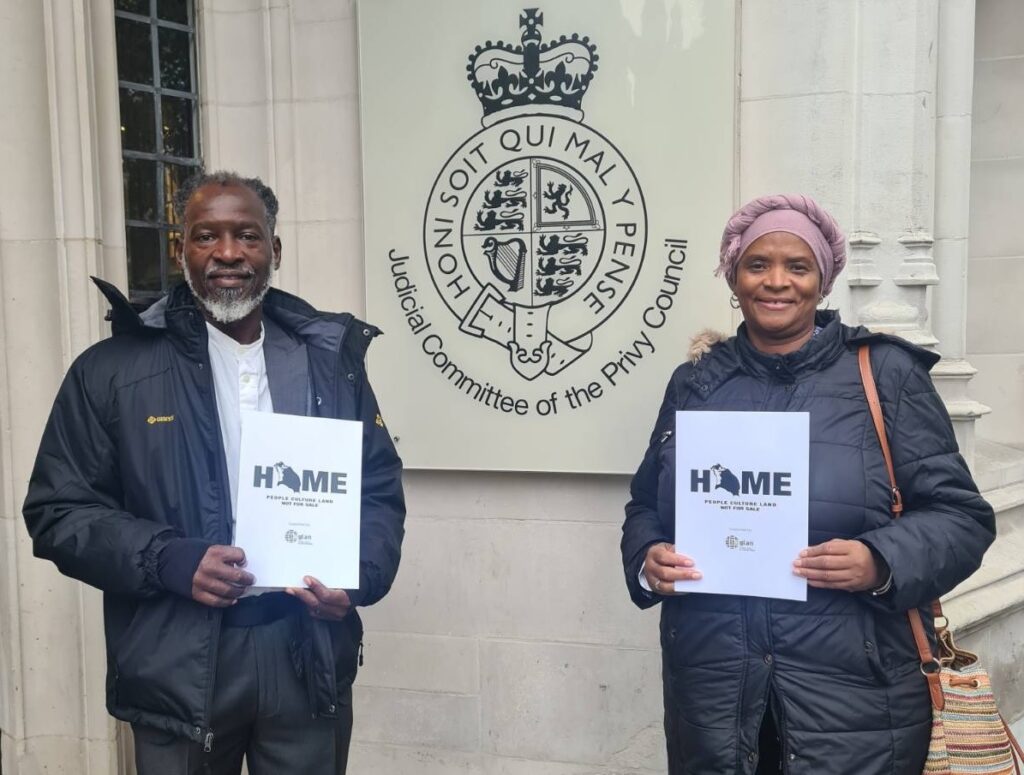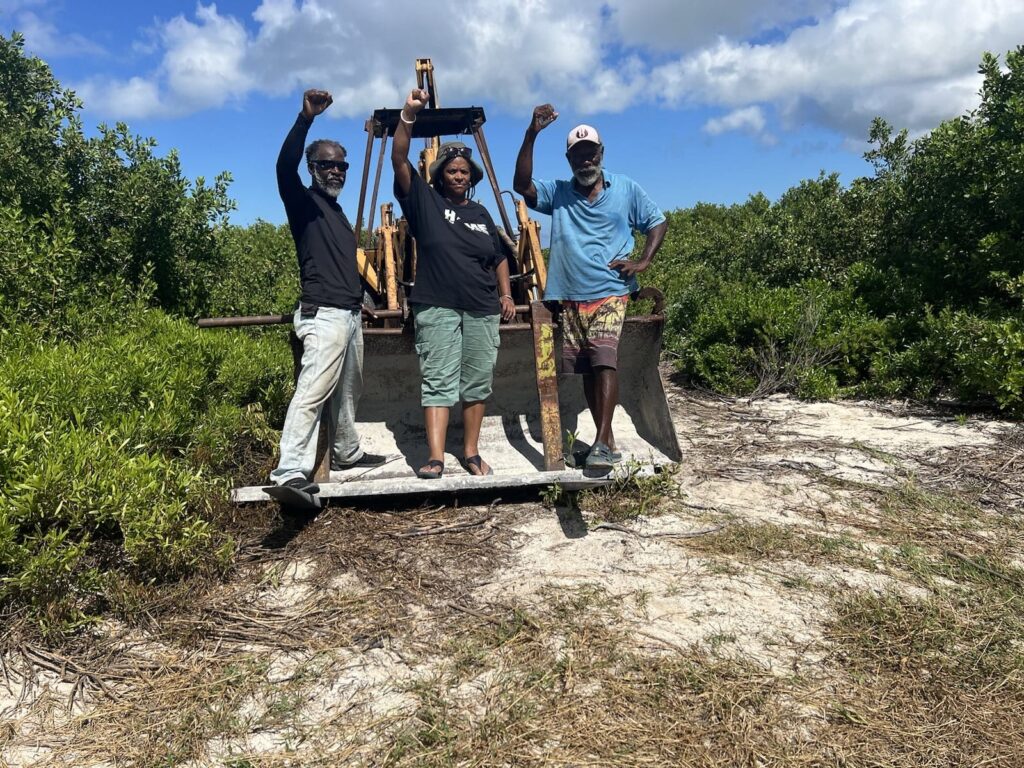Menu
Close

Barbudans John Mussington and Jacklyn Frank take their case to the Privy Council. Photo credit: GLAN
“It doesn’t stop here with us. If you look at the following for the case internationally, it was huge. It’s gonna affect South America, it’s gonna affect Jamaica…Haiti, Grenada, St. Lucia. All the islands.” John Mussington shared these inspiring comments in a video along with Jacklyn Frank in the wake of their major legal victory at the UK Privy Council on February 27, 2024.
In a precedent-setting case, the Judicial Committee of the Privy Council (JCPC) announced that they were ruling in favor of the appellants John Mussington and Jacklyn Frank in their case against the Development Control Authority, The Antigua and Barbuda Airport Authority, and The [Antigua] Attorney General.
Since making their case at a JCPC hearing on November 8, 2023, Mussington and Frank have been waiting for the JCPC to announce their ruling. Their persistence paid off as the JCPC overturned the ruling of the Court of Appeal of the Eastern Caribbean Supreme Court, stating that John and Jacklyn did in fact possess standing to request a judicial review of a major development project that began construction on Barbuda in the wake of Hurricane Irma, which struck Barbuda on September 6, 2017. That airport has already led to the clearing of 400 acres of forests inhabited by fallow deer and red-footed tortoise.
During a ruling debrief, hosted by the Global Legal Action Network (GLAN), one of the legal support organizations that worked with Frank and Mussington, the appellants, legal representatives Prof Leslie Thomas KC and Ms Thalia Maragh. of the Garden Court Chambers’ Environmental Law and Climate Justice Team, as well as GLAN’s director Dr. Gearóid Ó Cuinn shared their thoughts in light of the ruling.
During his remarks, Prof Leslie Thomas, KC, shared that the case is important for the 5 following reasons.
Standing of the Appellants: The Board’s reasoning highlights the importance of standing, or the legal right to bring a case, in environmental matters. The appellants, residents of Barbuda affected by the construction of an airport, are argued to have standing based on their proximity to the project and the potential impact on their quality of life, particularly concerning noise, disruption, and environmental damage.
Environmental Impact Assessment (EIA): The case underscores the significance of conducting thorough environmental impact assessments, especially in projects with potential environmental ramifications like the construction of an airport. The appellants raise concerns about hydrogeology and the potential contamination of aquifers, which are crucial for potable water extraction, emphasizing the need for a comprehensive EIA.
Failure to Follow Due Process: The failure to follow due process, such as starting construction without a development permit and lacking proper public consultation, is a significant aspect of the case. This highlights the importance of adhering to legal procedures outlined in the Physical Planning Act 2003 (of Antigua and Barbuda) and the necessity for transparency in decision-making processes.
Community Participation and Environmental Justice: The case emphasizes the right of individuals and communities to participate in decision-making processes concerning environmental matters. The appellants’ efforts to bring attention to the failures in due process and their concerns regarding environmental impacts align with principles of environmental justice and public participation, as outlined in international agreements such as the Escazú Agreement.
Expertise in Environmental Matters: The case challenges the notion that only experts in environmental matters have standing to raise concerns about environmental issues. It affirms that individuals with knowledge or concerns about environmental impacts, regardless of professional expertise, have a right to participate in legal proceedings related to environmental matters.
Adding to what Thomas shared, Maragh stated “…It is my hope that those who read this judgment who are involved in environmental protection…see that the tactics [of intimidation] used by the states are not experienced by you alone but have been experienced by John … I think it’s really significant that the Privy Council recorded this in the judgment.”
Dr. Ó Cuinn called what the Antigua and Barbuda government did and what the developers had attempted in excluding Barbudans from the project’s development process “An affront to self-determination. An affront to the rule of law.” To Dr. Ó Cuinn, the ruling ‘is not the end of the fight…this is the beginning of the validation of the Barbudans’ own claims to their land and their vision for development.”
The GLAN director highlighted another significance to the day’s ruling as it was one of the first rulings for the Caribbean region to cite the Regional Agreement on Access to Information, Public Participation and Justice in Environmental Matters in Latin America and the Caribbean, more commonly known as the Escazú Agreement. Antigua and Barbuda was the first country to sign the agreement on September 27, 2018, ratifying it in 2020, though its implementation has yet to be observed. This first citing of Escazú sets a precedent for it to inform future environmental defender cases.
At the debrief, the appellants themselves contributed powerful remarks. Mussington spoke of his appreciation for the regional support he received, morally and financially, that allowed them to take the case all the way through.
Mussington and Frank had been working on this case since before joining the Stronger Caribbean Together (SCT) network as representatives of Save Barbuda, consistently receiving support from the network when they went for their hearing late last year.
Speaking about his engagement with the Stronger Caribbean Together (SCT) network, Mussington stated, “One of the things that came out of that [interaction with SCT] was to find out that what happened to us in 2017 was also happening in Colombia, … Providence Island after another hurricane. Two years later, the same thing was happening in Grenada. And so you see a pattern. And once you understand that pattern then you’re better able to put up the necessary resistance that you need to.”
With that, Mussington was also reassured that this was not a fight he was in alone.
Offering advice to other environmental defenders in the region, Frank encouraged attendees to “Be persistent. Don’t give up, especially when you believe that you’re right. And the other thing that I found useful was to research the people doing the things to you. Find out about them, and see how they operate because that’s how they work with you as a people. They’ll find out how you operate, and what your weaknesses are. Investigate them to learn them and that will help you fight them.” Mussington also suggests people in the region use the internet for research and to build regional networks like SCT.
The case is certain to have ripple effects throughout many cases in the region, including another in Barbuda and an upcoming trial for Stronger Caribbean Together members from the Grenada Land Actors.
As environmental defenders continue to resist their displacement, Stronger Caribbean Together will be there to offer support and document their efforts as we further unite against disaster capitalism.
Quotes were subject to editorial review (where appropriate) for clarity.

Barbudans Prevail at Privy Council. Photo credit: PlanBarbuda.org

Showcasing stories of Caribbean organizations at the foreground of the struggle against disaster capitalism in the Caribbean. Our network of participants in the Greater Caribbean region connect, learn, share their hands on responses to the impacts of the twin threats of the climate crisis and disaster capitalism in our region.
WAVE (Progressive Reform Movement)
Global Challenges Research Fund
Open Society Foundations
All Rights Reserved – strongercaribbeantogether.org 2022
All Rights Reserved – strongercaribbeantogether.org 2022